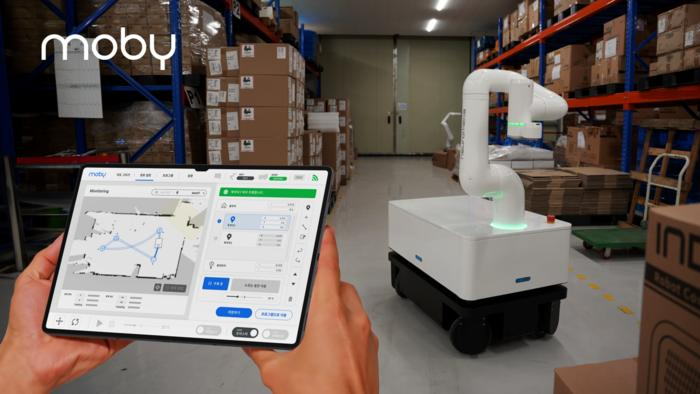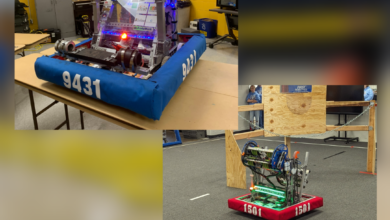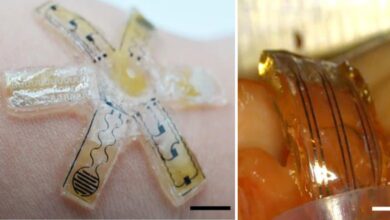ETRI Research Team Grabs iF Design Award

The ETRI research team earned the major prize in the German International Design Competition, one of the world’s top three design awards. This demonstrates global acknowledgment of the research team’s technology.
The Electronics and Telecommunications Research Institute (ETRI) announced that their Teach Pendant software for the autonomous mobile collaborative robot (MOBY1) received the major award in the User Experience (UX2) category at the ‘iF Design Award 20243’, an international design competition in Germany.
ETRI has been acknowledged for its expertise in the UX category with the “MOBY SW,” a teach pendant for a manipulator based on mobile robots, in partnership with Neuromeka and the research team of Professor Seung-Heon Yoo from the Department of Art and Design at Korea University.
The Teach Pendant application, a user interface program for independent mobile manipulators, is an award-winning project. This app’s intuitive and user-friendly design has received a lot of positive feedbacak.
ETRI handled the UX design and development of the Teach Pendant (MOBY app). Neuromeka built the hardware and framework for the mobile manipulator, while Korea University led the UX/UI design for the Teach Pendant app.
A mobile manipulator is a combination of a wheeled mobile robot capable of moving about and a robotic arm meant to execute tasks. It defines a robot that can be directed to perform both mobility and manipulation functions.
The MOBY SW has substantially reduced the hassle users experienced with prior teach pendant devices, which required separate instructions for the mobile robot and manipulator. It enables the movement and functioning of the mobile robot and the manipulator to be controlled by a single software.
According to ETRI researchers, the teach pendant has made it feasible to concurrently define pathways and destinations for mobile robots to go autonomously. It can also be used to educate manipulators on how to manipulate objects, significantly improving user ease.
Specifically, no teach pendant among current products has been able to integrate and use manipulators and mobile robots simultaneously. Since this is the first teach pendant for mobile manipulators developed in Korea, the award has even more significance.
The researchers created a teach pendant that enables the creation of driving programs, work programs for manipulators, and maps and routes for mobile robots to navigate autonomously. This advancement is anticipated to significantly streamline the intricate procedures associated with automating future tasks.
Owing to its user-friendly interface and the availability of programs that follow the Behavior Tree (BT) methodology, even people without programming experience can program tasks for robots.
Through user research with general users at Keimyung University’s Usability Evaluation Research Center, which focused on the robot’s Pick and Place tasks of moving and arranging objects at precise positions, ETRI was recognized for the brilliance of its teach pendant. Its usability has been confirmed, demonstrating that even non-experts can use it without coding knowledge.
According to a report by the worldwide market research firm IDTechEx, the mobile robot industry is anticipated to increase at an annual rate of 18.9 % over the next 20 years, reaching a value of 1,500 billion USD (190 trillion) by 2044. The created teach pendant is anticipated to be used in several industries, such as small and medium-sized manufacturing firms, food and beverage, logistics, warehouse, market, and museum service sectors.
Professionals with extensive knowledge of mobile robots, collaborative robots, and vision are uncommon in the automation sector. The researchers think that by simultaneously lowering the entry barriers to these three robotic elements, the developed teach pendant can secure a larger user base.
As robots are expanding into various fields, we hope that the user-friendly teach pendant will serve as a foundation for not only robot experts but also the general public to easily use robots.
Dr. Jeyoun Dong, Robotics & Mobility Research Section, Electronics and Telecommunications Research Institute
Seung-Heon Yoo, a Professor at the Department of Design at Korea University, added, “Robots are quintessentially technology-intensive products that must also reflect the value of user-centered UX design. The approach that ETRI and Neuromeka have actively agreed upon and achieved together highlights this.”
ETRI has opted to transfer this technology to firms specializing in collaborative and mobile robotics, aiming to achieve complete commercialization. ETRI also intends to work on improving features such as mobile robot-generated maps within the app for the benefit of users.
The iF Design Award, organized by the International Forum Design in Germany, is one of the world’s most prominent design competitions. It is regarded as one of the top three worldwide design awards, alongside Germany’s ‘Red Dot Design Award’ and the United States ‘IDEA.’
It awards honors in nine categories: product, packaging, communication, concept, interior architecture, service design, user experience (UX), and user interface (UI).



